

|
Back to |
| The Front Page |
| People |
|
Farewell, Martin and Hello, Stephen |
|
Interview with Martin French by Bob Alman photos courtesy of Martin French Posted September 13, 2013
|
Martin French is the third consecutive Secretary General to resign prematurely but amicably on philosophical grounds. They were all born Brits, as is the newest one. Martin talks, as frankly as he is able to, about his reasons for leaving and what most needs to be done next by the sport's global organizing authority to maintain and expand the growth of our favorite sport
BOB ALMAN: May we assume that the transfer to Stephen Mulliner of all the aspects of the Secretary-General job proceeded smoothly and happened completely by the end of August, as projected? And if not, what is still to be done by Martin French?

|
| Martin and wife Cathy bracket their two sons: Innes, who is halfway through a Chemistry degree; and Aston, now completing a Masters in Astronautics and Space Engineering to add to his Physics degree. Cathy is a local councilor and director of a regional charity providing parenting help to people who need it. |
BOB: How close is the WCF to taking over all the legitimate "international" functions of croquet--with respect to the major championships (already done), the MacRob (recently done), and finally, the laws (accomplished only for Golf Croquet but not for Association Croquet)? Should this happen during Mulliner's four-year term?
MARTIN: I thought we might achieve it – it was certainly one of Charles Jones’ goals I set out to deliver after his death. But bringing the AC Laws into a WCF AC Laws Committee is in the hands of the four Mac countries.[England, Australia, New Zealand, USA]. They currently control the ILC (international laws committee) and they all need to support the move to a new structure. I thought a couple of times we’d cracked it, but each time, one country would block it. So the timing is up to the Mac countries.
BOB: My impression was that your WCF BLOGSPOT was intended to be a reader-friendly and inexpensive alternative to a mailed WCF newsletter. The last entry is more than a year old. Has it been abandoned, or will Stephen Mulliner continue it?
MARTIN: I started it when I took over as it was clear we needed to communicate better. After some months, though, the newsletter and better email communications seemed to be bringing the improvement in trust we were hoping for. When it was easier to add news items to the new website, I found it increasingly difficult to remember to put news on the blog too. I don’t know Stephen’s plans for the blog.
BOB: In your letter of resignation to the WCF Management Committee, you said, "I had hoped to complete my four-year term, but over the past six months have had increasing difficulty with some of the discussions within the Management Committee." Were these issues of personality or process, or both? And what precisely was the tenor of the "difficulty" with the discussions? Was your own principled opposition to a Management Committee majority a stopping point? I have been told that the critical issue was "team allocations." What happened?
MARTIN: Hmm, I’ve thought about this a lot since. It wasn’t the case of particular individuals not getting on with each other, full stop. But I did feel that the four Brits on the Management Committee knew each other too well, for too many years (more than 25 years), so would at times argue pretty brutally with each other and at great length. It could be any two or three of us arguing with each other, depending on what the issue was this time. And increasingly, it dawned on me that the other MC members were disengaging from the discussions. I didn’t think the situation was at all healthy but couldn’t find a way to stop it.
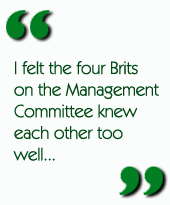
There was also a basic process--or really structural--problem. Many of the MC members were (quite reasonably) interested in policy issues – for example, how should we ideally allocate places to Members [national associations] for the next event? But the Secretary-General has a different angle--I simply wanted to be able to apply the relevant regulations and work out correctly what the right allocations were. But each time we went through this step for a forthcoming event, I found we ended up with a different take on what the regulations were intended to mean. One time, the MC's view was that we shouldn’t follow the regs blindly but instead apply some discretion--but the next time, I was told we needed to do exactly what the regs said and didn’t have any discretion. I felt less certain about what these regs meant after each allocations or wild cards argument. I’m a pragmatist; mostly I didn’t care what the answer was, as long as I felt we were being consistent and clear. I argued against some proposed decisions because I felt we were being inconsistent. It wasn’t a case of me disagreeing with the MC on a matter of principle, more that I lost confidence in some of the decisions we were taking.
BOB: It occurs to me that "inconsistency" would be the logical grounds for attracting criticism from the greater public--and that actually happened, and it must have been off-putting, because I'm pretty sure most people envision the Secretary-General as the guy who makes things happen. But you found no way to iron out the inconsistencies.
MARTIN: Ultimately, I decided to leave because these continuing arguments and uncertainties were making me unhappy. When you run large programmes (as I used to do for a living), you get used to managing disputes, but it can be bruising work. It’s easier to tolerate when it’s your job and you’re being paid well to sort things out--but here, I couldn’t see any prospect of the situation getting better, so decided to leave. We’d achieved a lot to be proud of in the past 2.5 years, but I felt it was better now for someone else to take on the challenge.
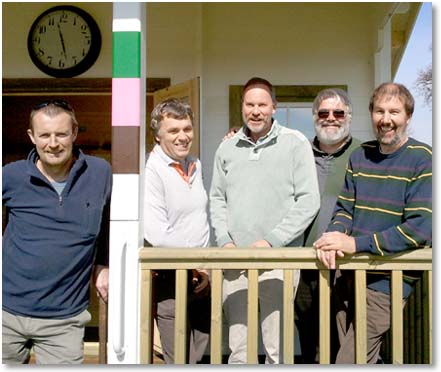
|
| As secretary of his local Ipswich club, Martin and four friends built a pavilion at their new location, after moving to a golf club from a public park. |
BOB: So it wasn't just the team allocations, it was the clear evidence, sometimes commented upon on the Nottingham Board, that the regulations were being interpreted in different ways. And it would have been rude or impolitic for you to reply, "You're right, but that's what the Management Committee decided, and I am only one vote." Instead, you thought a more streamlined process for decision-making in the Management Committee was needed, but not everyone on the MC agreed. Can you say who, in addition to yourself, supported a more streamlined process, and who opposed it?
MARTIN: It wasn’t so much a "streamlined process" I was after, as a feeling we needed a different structure which separated the operational, day-to-day things from the policy-related discussions. I came up with an idea--again, something I used to do as a consultant in my working life--to separate the two into a three-person management board and a larger policy-related committee considering the difficult allocation and wild card matters. Stephen Mulliner did some useful analysis that showed that virtually all the topics where we had protracted argument and difficult split votes had been in the allocation and selection field--things about players – so it made sense to me to separate this from day-to-day activity. The MC had a range of views on this idea, and I did incorporate some of these into a revised proposal--but frankly, I felt it was becoming overly-complex. There wasn’t much real enthusiasm for this change and I had already resigned by this stage, so I had no desire to try to force it down anyone’s throat. Better the next S-G considers how to improve the structure--or as USCA suggested to Council, a small group is set up to go away and independently consider an improved structure.
BOB: Mike Orgill suggested that?
MARTIN: I believe it was Martyn Selman, from the USCA International Committee. And another idea that came up at the Council meeting that is worth considering is to consciously replace the MC – where members are not supposed to be national representatives but in it for the 'good of world croquet' – with a policy body which is quite definitely representative. This could then have a rep from each of the Full Members for example, and legitimately decide policy--but without operational involvement. For me, it was the conflict between what the S-G wanted out of the MC discussions and what the other members wanted which was at the heart of the problem. Stephen has an interesting take on how to handle the issue, which is worth exploring too.
BOB: There are lots of distinctions here, so just to be clear, let's walk through them one at a time: First, you were proposing something that we would call in the US an Executive Committee, to handle the routine issues that probably wouldn't be controversial--to which you, as Secretary-General would usually propose solutions and have them quickly approved, so everybody would assured that you have adequate oversight? Is that fairly accurate?
MARTIN: Nearly, I was proposing a Management Board where the three people were each focused on one of the main three things we do: an S-G who handled the comms and admin; an Event Director who looked after the organisation of forthcoming events; and a Development Director who drove a development plan. You could call the S-G something else if preferred to make clear the difference from the existing structure – some preferred "Chief Executive" – I wasn’t too bothered about the labels.
BOB: That sounds sensible, but not that much of a change. Hasn't Mulliner been managing most of the recent WCF events anyway? As for "development," the implementation of the ten-year calendar and the choice of the events on it seems to chart a de facto path of future development in the realm of events, while the recent re-classification of members lays a foundation for continued expansion of the countries affiliated. But I can understand how eliminating or replacing or changing the functions of the Management Committee would be met with resistance. Those are political considerations, but the WCF Management Committee really IS a political body in that sense, as you've indicated. So anything you could do to have the "non-political" issues and processes handled somewhere else would be useful. Go ahead: correct my analysis again!
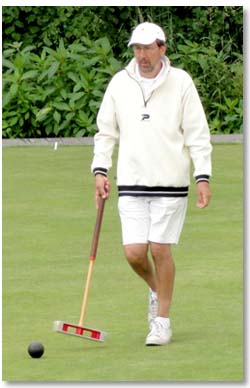
|
| Martin played in the Chairman's at Ramsgate in September 2012. He likes to compete in about two events a month, in season. |
BOB: But wouldn't such changes have to be approved not just by the Management Committee, but by their individual national associations?
MARTIN: The normal process would require only the MC to consider and approve any change to the structure, even if it affected the MC itself. Maybe that affected their enthusiasm for it, or maybe my proposal just wasn’t that good! The idea of setting up a small group of people (not on the MC) to go away, think about the problem and come back to Council with some recommendations could avoid the political problems. And it was also evident that as well as Ian [Burridge, treasurer] and me resigning, at least two other MC members are due to complete their 4-year terms this December and have said they will be retiring – so with 4 out of the 9 changing anyway, it was an obvious time to look at a new structure.
BOB: What was Stephen's proposal on fixing the problems with the Management Committee?
MARTIN: Stephen has pointed out that nearly all of our difficult issues have been in the same "allocation and selection" space, so if he can get Council agreement on exactly what the policies should be for these, and update the regs accordingly, then much of the rest of the MC work may turn out to be non-contentious. If that’s right, the current structure may function well enough and the issue of structural change will cease to seem urgent. Personally, I’d suggest doing both – see if Stephen can manage the difficulties and make the job run smoother and in parallel ask a group of the 'great and the good' to think about whether there's a better structure that could be tried.

BOB: I see a different issue here, and that is Stephen's apparent insistence on always being right, regardless of the facts or the statistics or what anyone else would prefer. It seems very far from your approach, and yet here you are, resigning "on principle" as have the last three Secretary-Generals. I've seen some energetic exchanges from Stephen recently on the Nottingham Board with Chris Clarke and Louis Nel, to name two who have tried and failed to move Stephen. So here's my question: Do you think a Sec-Gen unwilling to be wrong--or let's say extremely reluctant--is a positive or a negative attribute in that role? (And I know I could be accused of exaggerating here, and that Stephen could certainly make a strong case, with his superb debating style, that I am just as wrong as Chris and Louis!)
MARTIN: Having a playful, knock-about exchange with Chris Clarke on some topic or other is quite different from having the responsibilities of the S-G role, and I know from my recent discussions with Stephen he understands that. You’re right that by and large, as S-G it is useful to have the attitude that you want an answer, much more than you care what the answer is (to me, this is the typical attribute of a good programme manager). But despite his legal training (where one outcome desired by the client might be pursued at any cost), Stephen is also a pragmatist. He was part of the small group of people who got the WCF going in the mid 1980s and he very much cares about it. I think he’ll be fine. He’s probably a stronger character than me too, so better able to withstand some of the crazier persistent arguments that can plague MC discussions.
BOB: I have to say on Stephen's behalf, too, that he's a spirited competitor in Golf Croquet--he is not one of those "game snobs" who actively denigrate Golf Croquet and thus, in my opinion, tend to denigrate the entire sport of croquet in the eyes of the public. Reg Bamford is also a hero in this regard. It seems to me that the individual countries as well as the WCF globally need to actively promote Golf Croquet to the public--a game they can understand on short acquaintance and enjoy as spectators, and thus potentially become interested in learning to play, or even forming a club or building courts. And at the same time, Association Croquet needn't be shown at all--except in still pictures, because in STILL pictures, the average viewer or reader can't tell the difference. But showing MOVING PICTURES of Association Croquet on television may actually do more damage than any benefit it might create. Might this be an explicit goal of WCF publicity, supported by the Management Committee? Officially discouraging moving pictures of Association Croquet and at the same time actively promote moving pictures of Golf Croquet?
MARTIN: Hmm, so you want a publicity campaign behind Golf Croquet and a secrecy campaign for AC? I’m not sure what some of the WCF Members would think of that! I entirely agree that publicising Golf Croquet has much more likelihood of success in attracting people to play croquet than does AC. But after 30 years of trying, I think there is really very little hope of getting any serious coverage of croquet on television in any form, I’m afraid, so this becomes a bit of an academic question. If there is going to be a step-change in the attempts to publicise the sport, at least at WCF level, then we need the right person with the right marketing skills to come forward and lead the campaign.
BOB: It isn't just an academic question, Martin. No serious attempt has been made to show television producers what a top-level Golf Croquet competition could look like on TV. In fact, the spectacle we produced at the National Croquet Center for the exhibition game between Younis and McInerney in the 2012 Palm Beach Polo Golf Croquet Invitational --complete with hundreds of spectators riveted to the action--was just what is needed, but we only realized that after the fact. So with the president of the USCA and the General Manager of the National Croquet Center, we put together a budget and likely funding that could cover everything required to produce a three-camera record of the action. We'll look for major sponsorship to finance the editing, when the time comes to do this--even if we have to wait for the next Golf Croquet World Championship done at the Center. We need to do a REAL-TIME demo for TV assignment editors, because without a real-time, continuous presentation, Golf Croquet looks exactly like Association Croquet, so it's our fault that we've turned off the press, big-time. TV assignment editors think they already know what we're doing--and they don't, at all. We need to show them. Do you think the WCF would help us fund editing the finished video?
MARTIN: For the 2012 GC World Team Championship in South Africa, the WCF did support the professional production costs of a 25-minute TV programme that was shown a few times on the SA equivalent of Blomberg business TV. We made copies available to our Members to help discussions with potential sponsors. I watched it, it was well done. It wasn’t gripping or a spectacle, in the way that games 3 to 5 of the final between Nasr and Reg in the 2013 GC Worlds were. That was fantastic, but even so the match was around 5 hours long, and even after the first two slower games are discounted, the exciting final three games total nearly 3 hours. It’s a big step to get anything like that broadcast. It’s even more difficult to get it watched by anyone not already a complete fan of croquet. I can say this now that I no longer have any official position: I don’t think croquet, even the best Golf Croquet, has a future on TV. I’ve just checked and on You Tube, the videos posted of the 5th game in the 2013 GC Worlds final of Nasr and Reg have a total of 3,000 viewings. Hardly mass market.
BOB: We reviewed the South Africa video and all agreed that it's the best so far done, but as you acknowledge, it wasn't designed to capture the attention of a TV assignment editor or producer, and it was nowhere near good enough for American TV. So we used that video as a basis for determining what standards we needed for our production--including the size, quality, and attention of the audience and the interest level of the narration, and the pace of the game. The most important thing we noted is that it was NOT done in "real time" so uninformed viewers (and TV assignment editors!) may still have images of "Association Croquet" stuck in their minds that have to be dislodged. One of the things we'll look for is a game between champions that is less than an hour long, and probably they'll be prepped to keep the action moving. So I'd say, Martin, that the case for putting Golf Croquet on TV has not been yet been made in a video. We intend to rectify that here at the NCC when we have the next major event, if nobody else does it.

Now, I'll ask a related question. The study done by the English Croquet Association on Golf Croquet seems designed to show that Golf Croquet is hurting the development of local clubs, which is "proven" in the statistical decline over recent time in enrollments in major events. I believe this is a misleading correlation, due to the newness of Golf Croquet as an important element in the local clubs. As head of the Association Croquet Selection Committee of the English Association, the AC might expect you to have the same point of view. Do you consider Golf Croquet as an opportunity for the sport or a threat, at the local level; and at the national and international level?
MARTIN:The CA study came to many conclusions. It found that the number of clubs is at the highest level it has ever been. There are more croquet players in clubs and who are members of the CA than ever before. It found that the entries for AC calendar fixtures (i.e. tournaments held all round the country and advertised by the CA) were static or in slight decline. Some speculated whether this decline was "Golf Croquet's fault". Others drew different conclusions: there is always some annual variation (who knows why: weather, economy, what world championships are planned?) – and in fact the season following the study I believe there was a small recovery. But it cannot be denied that Golf Croquet is growing steadily and AC is roughly static. I meet zealots who think one code or the other is 'dreadful' and only their favourite form is worth playing. Personally, I’m a croquet player and I enjoy both codes. The CA equally supports both codes. I think Golf Croquet has been of great benefit to the sport over the past decade, bringing many new people into the clubs and so helping finance the facilities both codes require. I think this has been the case in many of the larger croquet-playing nations.
BOB: I hear a "but" coming...!
MARTIN: But the issue that dogs us all, I think, is that the average age of new croquet players is getting ever older. I gather the average age of a new member of the English Croquet Association is now over 65. This is not caused by the relative merits of GC or AC. It is caused in part by the post-war "baby boomer" generation who are all retiring about now, and taking up social pastimes like croquet. Few of these will turn into serious competitive players, but they still bring in finances to the clubs and so are to be welcomed. The real problem, I believe, is that the demographic that could be defined as "young, competitive but not athletic", some of whom used to take up croquet and get very good at it very quickly, are now much more likely to satisfy their competitive needs through internet gaming. So there are far fewer of these coming into the game now that when I first started.
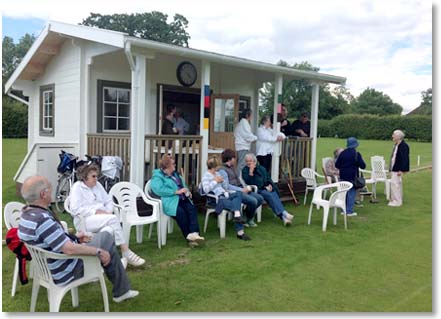
|
| Club day at Ipswich attracts a crowd of senior players--and sitters. |
I began playing in tournaments when I was around 30, and was soon surrounded by a large number of keen 18-year olds – names like Fulford, Clarke, Maugham, Cornelius, Burridge, Saurin, Avery, Walters, the Palmer brothers, Reeve and so on. Many of this wave of youngsters are still amongst the best players in the world – though now in their mid-40s. The big problem is that no similar wave of youngsters has come through since, just the occasional ones or twos. If the dynamic excitement of Golf Croquet can help croquet to re-engage with this demographic, it can help save the sport. Otherwise, it looks likely croquet will increasingly be seen as a game only for the elderly, which would be a great pity. What approach can we take to compete with internet gaming?
BOB: Thank you for turning the interview around and asking ME a question which I am glad to answer, with another question: "Should we really be interested in recruiting some young person stuck in front of a screen "gaming?" I don't think so. Instead, we need to emphasize the social attractions of our sport, and protect the young group from the old people. I know this sounds radical, but I also know it works. It can only be done in just a few places, of course, with exceptionally fine social amenities and the kind of environment that could "seduce" younger people looking for a decent place to go and meet peers (peers in age, I mean) after office hours: a place like the National Croquet Center, which is also plagued by the problem you mention. Too many old people! (I can say that, since I'm 74, myself!)
When I was managing the Center, I found a solution, but it lasted only 13 weeks which happened be in the period when I was preparing to leave management. The solution was "The Five to Nine Club," and I did not allow anyone in the bar who did not belong to the "youth" demographic. If they or their spouse or friend didn't work some version of five to nine, they weren't eligible. There was an entry fee that included a drink ticket, but if they became a "Social" member, that entry fee did not have to be paid. We had about 10 new members on that basis, after only 13 weeks, and they all disappeared instantly when the "management committee" who succeeded me decided the Five to Nine Club should be merged with the regular social evening on Thursdays. What a disaster! The young people came once to the new, combined event, but never came again when they saw all the old people at the bar!
MARTIN: If it worked then, why don't you repeat it?
BOB: Thanks for continuing the Bob Alman interview! I was urged to repeat it, and when I did, several years ago, I uncovered two new problems: First, if the management isn't fully and actively supporting it (inviting the boards of potential clients of non-profits or corporations, for example, along with the many "Young Friends of...." who are always looking for attractive meeting venues) it's not going to have sufficient initial numbers to be viable as a social occasion, where young people can "network" professionally or socially. The other problem in the revival attempt I made is that we wanted to make bar and dining both feasible by having an extra bar on the veranda and the dining room open, but because we barred regular members from the Five to Nine Club (considering it a "private event") the regular members boycotted it! Not a single regular member showed up on that night to enjoy the extra benefit of bar and dining, in "protest" to "unfairly" excluding regular members from the bar. No, they didn't know the earlier history of the Five to Nine Club, and that might have made a difference.
MARTIN: Will you ever do it again?
BOB: Since you asked, there's a better chance now of having it work, because the front office staff has changed (they're more competent and focused) and the National Croquet Club is now better organized, and I'm on the Membership Committee of the club, so there's now a chance to inform the club leadership on the potential of this event to build overall membership and expand the National Croquet Club with a younger demographic. I'm cautiously optimistic about it. Incidentally, the "social" membership at that time was really a Golf Croquet membership on half courts, at limited times scheduled to support overall bar and dining. The club now has no Golf Croquet membership. I'm sure it will happen, it's just a matter of timing.
Let's turn the rest of the interview back to you, Martin: Is there anywhere in Britain where this kind of thing is done--that is, where young people are protected from old people in a croquet environment they, themselves, manage? (And I'm not talking about Croquet East, but that remarkable organization actually demonstrates the viability of croquet for a younger and self-managed group.) Is there any croquet organization in Britain bright enough to have a separate club devoted to younger, working people, which they attend exclusively and manage on their own? And if not, why not?
MARTIN: There have been over the years a number of clubs at universities which were organised by predominantly young people for young people. The problems have been particularly that with the churn in students every few years, none has persisted for very long; and the 3-month summer holiday coincides with the best of the croquet season. On your suggestion of a club devoted to younger working people which they attend and manage, I suspect the age discrimination legislation would make that as unlikely now as having a new "men only" golf club, or any other restricted entry.
BOB: I agree that expending resources in colleges is not worth it. But for young working adults, we have any number of "Young Friends of....." organizations in Palm Beach County, which is an ideal target audience for "social members" centered on the bar, with Golf Croquet available. "Clubs" are restrictive by their very nature. The Five to Nine Club was called that largely to telegraph its exclusivity in the name. And we constituted it as a "private group" with an entry fee to nail down the point. The ideal group for a social environment like the bar of the National Croquet Center are working people in their 30's and 40's. Many if not most are married or couples, who ESPECIALLY want a place they can go after work that isn't a pick-up joint. Singles could also come, looking for a date in an elegant, low-key environment--place where you would have a chance of meeting "the one" over a casual game of Golf Croquet, the ultimate social sport. That's a "seduction strategy" that few facilities are equipped to employ. But the National Croquet Center IS equipped, so I say we should find a way for it to succeed as one of the avenues to expanding croquet's demographic.
But I can see we've exhausted this subject, Martin. We Floridians are going to have to demonstrate the way to do croquet for a younger group, just as we will have to show you how to educate the media about the all-new and excitingly sporty form of the game we call Golf Croquet--which they can't see now because they have old images stuck in their heads. I'm pretty sure you're willing for us to be successful in both those goals, and both of them are made possible by the "gift" Egypt has given to the sport: Golf Croquet. Who would have thought? So let's turn that into a question: What is the NEXT most promising unexplored or untried avenue for development of the sport, worldwide, in your opinion?
MARTIN: Hmm – I suspect you need to ask that to a marketing expert, which I’m not! Perhaps a well written, high resolution graphics croquet game to play on-line? And hope for some pull-through into the real game?
BOB: But I AM an expert in marketing, promotion, media, branding. Corporate Communications is the main basis of my croquet career. And I've either already done or planned and financed these two strategies, so I rest my case, for now. I'll get back to you when I can report actual results! And I'll acknowledge here, that I'm probably the oldest survivor still standing among the legions of well-intention people who said, "I know how to make this work, and..." Which brings me to the question: "What's next for you, Martin? You're retired, you've just completed a demanding commitment with the WCF that took nearly three years. Are you going to relax for a while and take a well-deserved croquet vacation, or what? (I mean, besides being the official Selector for the English Association Croquet team.)
MARTIN: I think I already play about the right amount of tournament croquet – if I do more than two events per month, I really don't have the motivation. So unlike the CEO a few years ago who "retired to spend more time with his golf clubs", I don’t plan expanding my croquet playing commitments. Though I do plan to re-balance the mix of AC and GC events--currently my annual calendar is too focused on Association Croquet events, whereas I'm finding Golf Croquet more interesting now.
I want to make faster progress renovating the large run-down house we bought a few years ago, so that at some point we can sell-up and move somewhere by the sea – we hope to build our own house too if we can find a suitable plot. We’ve also recently twinned our croquet club with the Bela Romao Croquet Club in Portugal, and I’m trying to organise a trip there for a group of club players in the next couple of months. More holidays beckon too – so plenty to keep me very busy.
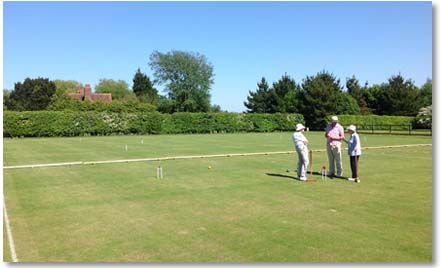
|
| With more time to devote to croquet, Martin will be playing on the two courts of Ipswich, which has at least one especially challenging slope. According to Martin, "When the lawns are hot and dry, the incline makes Golf Croquet fun and Association Croquet especially tricky." |
BOB: Building a house, playing a sport, foreign travel. You're turning yourself into a "retired" cliche, Martin--which is great! But I can't help commenting that a club excursion to Portugal with some of your members is also a great development tactic for croquet.
Next question: Not very long ago, Stephen Mulliner insisted that the "decline" of the British players was neither absolute nor relative--a very patriotic stand for a loyal Brit. But the numbers on the upcoming MacRob in New Zealand clearly suggest that there IS at least a relative decline, as Chris Clarke pointed out on the Nottingham. Can you say why Mulliner would insist otherwise? Isn't it a good thing for croquet to have REAL international competition, instead of having Britain continue to dominate, just as it clearly is a good thing to have non-Egyptian Golf Croquet world champions, finally?
MARTIN: There are two points here. Yes, it is absolutely a good thing for world croquet for no one country to dominate either code, and to have real interest as to who might win the next Mac or Golf Croquet World Teams. As for the "decline" in British top players, the problem--if it exists at all-- is not with the very top but with the shortage of new players aspiring to get to the very top. All of Birch, Death and Patel are stylish and exciting additions to the England Mac team, each quite capable of beating anyone in the world.
BOB: Good enough. Now, what question would you like to answer that I haven't asked yet?
FRENCH: Can't think of any!
Martin French, 60, lives in Suffolk, about 75 miles from London. He started playing croquet in 1981 when 28, and reached Presidents Cup standard by the end of the 1980s, playing for Great Britain in the 1991 Solomon Trophy. He then took a 12-year break as his two sons were growing up, returning to croquet at the end of 2004. He took up competitive Golf Croquet two years ago and has just won his first Golf Croquet cup. Martin retired three years ago, after a varied career spanning chemistry teaching, bus driving, computer science research, project and programme management, business management and consultancy. He is secretary of Ipswich Croquet Club, on the English Croquet Association Council, and until recently, was Secretary-General of the World Croquet Federation.